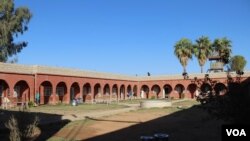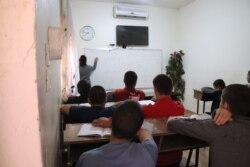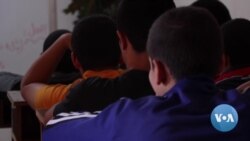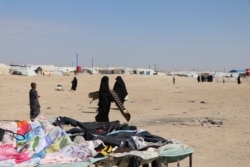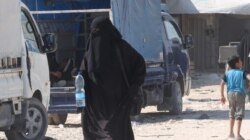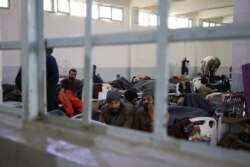"Blueberries," says Ahmed Bilal, 14, smiling as he reminisces about his old life in the United States. "I've never seen blueberries in Syria."
Bilal came to Syria when he was 8 years old. At the time, he didn't know why.
Now, he is locked up in the Houri Center in the country's northeast, a facility meant to deradicalize foreign sons of IS militants who have been abandoned by their home countries. Their fathers are all missing, in jail or dead.
Bilal says he is Turkish-American and has never been charged with a crime.
The Houri Center holds more than 100 boys from 22 countries, says the center's director, Jagar Qameshlo, and some are as young as 12 years old. He says staff are careful to call it a "school" and boys take classes in math, science, English and Arabic.
The main point of the center, however, is to prevent the boys from becoming terrorists when they grow up. When the boys turn 18, they are transferred to prison either way.
Qameshlo acknowledges this tragic situation for the boys, who did not choose Syria or IS; but he blames their home countries, which have often ignored calls to collect their citizens from camps and detention centers across the region.
"We are bearing the weight of 25 countries on our shoulders alone," he says.
Bilal remains hopeful his relatives in the United States will find a way to bring him back. He misses school, hamburgers and weekly family barbecues. He says he doesn't see how anyone could think of him as a criminal, no matter what his father may have done.
"It's not my choice to come or not," he says, fiddling with his hands and looking at the ground.
Swept up from al-Hol camp
Like most of the boys in the center, Bilal was brought here from al-Hol camp, which holds about 60,000 women and children. They are the families of IS militants who fought in Baghouz, the battle that ended IS's territorial rule in early 2019.
One day, about two months ago, Bilal says, he was going to the market in al-Hol, and guards told him to come with them. "They said, 'You are going to a nice place with PlayStation,' " Bilal explains. He then laughs, looking around at where they actually brought him.
In al-Hol, women openly preach extremism, and the self-proclaimed Hesba, or religious police, enforce draconian IS rules. Children insult, threaten and throw rocks at visiting journalists, and some whisper their plans to grow up to be mujahadeen, or warriors for Islamic State.
"In the camp, women live like they did under IS," explains Farhad Shami, a spokesperson for the Syrian Democratic Forces, the semi-autonomous region's main military force. "Those who break these laws are killed. Every month we find one or two people killed by IS women."
Since January, more than 70 people have been murdered at al-Hol.
When boys are between the ages of 12 and 14, they are taken from the camp without their mothers' consent, or often even their knowledge.
"He just didn't come back to the tent that night," says one woman at the al-Hol camp market. She is an ethnic Uyghur from China who calls herself Ayesha.
Women in al-Hol are wary of journalists and refuse to discuss most topics. But when the subject of missing sons comes up, they talk on top of each other and beg for answers. "Every mother has tears in her eyes," Ayesha says.
At the center, Bilal's eyes also grow moist when asked if he misses his father, who was killed in Baghouz. His mother and sisters are in al-Hol and al-Roj, another camp that holds foreign IS families. His older brother is in jail.
As a small child in Raqqa, then IS's de facto capital, he remembers his family had a large private garden with pomegranate trees, and he recounts hearing the bombs. Now in the Houri Center, he occasionally gets a short phone call from his mother.
The call is short, he says, because his mother is afraid to raise the suspicions of the religious police by speaking in English on the phone.
"They tell us don't think about that ISIS stuff here," Bilal says, shaking his head. "They say just think about how much you want to go home."
'Threat to the world'
The adult jails in northeastern Syria are also packed with 12,000 suspected IS militants from 55 countries, according to Shami, from the SDF. The prisoners have never been charged with or tried for a crime, and the buildings that hold them were meant to be schools or government offices, not prisons.
Guards call the situation "a ticking time bomb," with IS sleeper cells on the outside waiting for their chance to stage a jailbreak. Last month, the SDF discovered a car bomb outside one of the prisons and blew it up before it could kill anyone.
"This is a threat to our region," says Shami. "But it is also a threat to the world."
Like other officials, Shami says the solution for the adult prisoners would be an international court, set up in Syria. "Don't the victims and their families here deserve justice?" he asks.
But for the boys in the Houri Center, says Qameshlo, the only real solution is for their governments to take them back. Syrian boys can be tried for crimes and either sentenced to jail or sent home. But there is no future outside unending incarceration for foreign boys.
The center consists of a green courtyard lawn surrounded on four sides by a low building. Most of the rooms are crowded with bunk beds lining the walls. Besides classes, there are some activities, like crafts, board games and mandatory morning exercise. Football games are played occasionally.
Armed guards also patrol the rooftops, which are secured with razor wire.
Bilal says his main focus in the center is to try not to forget how to speak proper English, as classes are taught in Arabic. He has family in the U.S., he says, and he is waiting for them to come get him.
Another boy, Mohammad, 16, has been there for two years and has fewer optimistic goals. "They call this a school, but it is a prison," says Mohammad.
Bilal appears crestfallen at the idea, but quietly agrees. "Yes, I guess we are in prison."




